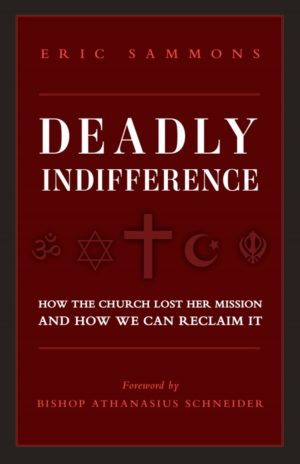|
Getting your Trinity Audio player ready...
|
Yesterday Pope Francis said, “This isn’t dogma, just my thought: I like to think of Hell as being empty. I hope it is.” As often happens following a controversial papal statement, debate broke out online as to whether this is a legitimate—i.e., an orthodox—viewpoint for a Catholic.
While that’s an important question, especially when speaking of the pope, it actually misses a more important point—the impact of hoping that Hell is empty.
But let’s first address whether or not this comment is orthodox. The pope’s first part, “I like to think of Hell as being empty,” isn’t really a dogmatic statement, as he himself notes. It’s just how he imagines Hell. I can imagine Heaven as a suburban country club—kinda like The Simpsons “Protestant Heaven“—and that isn’t heresy; it’s just my imagination. If the pope were to argue definitively—or attempt to define dogmatically—that Hell is empty, then we would need to argue about whether it was orthodox or not (spoiler: not).
Orthodox. Faithful. Free.
Sign up to get Crisis articles delivered to your inbox daily
And then Pope Francis goes beyond his imagination to his desires: “I hope it is [empty].” Again, this is not a dogmatic statement. I hope that the Cincinnati Reds will win the World Series this year, and I can have that (somewhat unlikely) hope if I want. Likewise, if the pope desires that Hell is empty, he can do so if he wants.
Of course, the pope’s hope that Hell is empty isn’t as harmless as my hope for a World Championship for my favorite baseball team. Our hopes very much shape our actions and our beliefs: my love for the Reds leads me to attend their games and emotionally invest myself in their success (and, too often, failure). Likewise, a hope that Hell is empty has a huge impact on how we live as Catholics. This, in my mind, is the more important question, rather than more endless debates on the orthodoxy of the pope’s off-the-cuff statement.
As I detail in my book, Deadly Indifference, there’s been a huge emphasis shift in how Catholics view the salvation of non-Catholics in the past century. Until the middle of the 20th century, it was assumed by most Catholics that most (if not all) non-Catholics were destined for eternal hellfire. Yes, the Church long taught that one could be saved by a baptism of desire, but this teaching was something relegated mostly to theological debate among scholars and churchmen. The common view—and the common teaching heard from the pulpit—is that Catholics should assume that non-Catholics were very likely going to Hell.
This common assumption had massive implications. The most vital being that Catholics felt a duty to work for the conversion of non-Catholics, whether that be by supporting missionary works or by urging non-Catholics to become Catholic. It also meant that Catholics were wary of becoming too culturally close to non-Catholics. “Mixed marriages” were verboten, and Catholics tended to live together in small neighborhoods (the Catholic “ghetto”) in order to protect the faith of their impressionable children. And finally, most Catholics doggedly remained Catholic, knowing the alternative could be unthinkably horrible.
Once that emphasis shifted, however, and Catholics began to expand the application of baptism of desire to its breaking point (a majority of Catholics now believe other religions can lead a person to Heaven), then how Catholics lived and interacted with non-Catholics dramatically changed.
Missions collapsed. Catholic neighborhoods disappeared. And Catholics left the Church by the millions.
This is not a coincidence. If you don’t believe you need to be Catholic to get to Heaven—or, more radically, you believe everyone is getting to Heaven regardless of how they live here on earth (“Hello, Mr. Hitler! Good to see you here in Heaven!”)—then the importance of both practicing the Faith and sharing it with others collapses. Catholicism is reduced to something that makes you feel good; a social club with some cool-looking ceremonies.
Now, one could spin the pope’s comment that “I hope [Hell] is [empty]” by saying that the Catechism itself states that “In hope, the Church prays for ‘all men to be saved’” (CCC 1821). But there is a big difference between hoping Hell is empty and hoping and praying for the salvation of each individual soul.
By this author:
To return to my baseball analogy, before each Reds game next season, I will hope that the Reds will win. However, if you asked me if the Reds will win every game next season, I know they will not. Losing some games is just the reality of a 162-game baseball season, no matter how much I hope for victory.
Likewise, if you ask me if I hope for the salvation of any specific person—my wife, my kids, President Biden, Elon Musk—I will answer in the affirmative. However, I know—because Christ has made it clear that this is the reality—there are people in Hell. As the Catechism states,
The teaching of the Church affirms the existence of hell and its eternity. Immediately after death the souls of those who die in a state of mortal sin descend into hell, where they suffer the punishments of hell, “eternal fire.” (CCC 1035)
An empty Hell undermines the entire purpose of Catholicism, and makes a mockery out of the words of Jesus, who warned us to avoid Hell and talked of people being thrown into the eternal fire (cf. Mt. 25:41). Jesus, in fact, talked more about Hell than he did about Heaven. Why bother if no one is going there? In fact, if Hell is in fact empty, that makes Jesus a deceiver, for his words assume people have gone—and will continue to go—there.
So we can see that Pope Francis’s hope that Hell is empty is not harmless wishful thinking. It leads people away from a serious practice of the faith, and it leads them away from bringing others to a serious practice of the faith.
Ironically, a hope that Hell is empty will do much to help fill it up.


